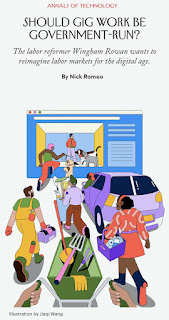That day, I whispered a little prayer of thanks for another huge project secured, signed and sealed. It was unexpected, something that I didn't aggressively pursue, but simply asked. It happened and I can't be more grateful. This project would pay my bills and support mini charity projects through 2022. I'm really enjoying this freelance / project-basis model of work. I'm fine with the uncertainty of income, since it does average out fine year on year. My expenses have pretty much stabilized, pending unforeseen accidents.
The man and I are lucky to hold jobs that provide a steady income. The man's mode is more regular than mine, of course. I do gigs. Hahaha. We're privileged enough to have access to funds to generate greater savings. We don't know if 'retirement' is in our vocabulary. Work is fulfilling, to a large extent. I don't think that the traditional definition of 'retirement' is applicable anymore. It's impossible to depend on savings when there's inflation and economic uncertainty. Retirement would require continuous income in one form or another.
I had to read Nick Romeo's opinion published in The New Yorker on March 23, 2021, 'Should Gig Work Be Government Run?' It's still very theoretical (economic), but it's being played out and accelerated in the pandemic where the traditional model of jobs have been thrown topsy-turvy.In 2019, California reclassified some part-time and gig workers as employees rather than contractors, enabling them to be entitled to paid sick leave, guaranteed minimum wage and a host of company benefits otherwise out of reach for them.
This article highlighted the gig economy, and a loud voice advocating fair regulations and participation through labor reformer and Director of Beyond Jobs in Britain, Wingham Rowan. He advocated for the new law in California on the ballot on Proposition 22, or Prop. 22. It passed in November 2020, and it's the most expensive ballot measure in history. It's very American and UK centric, so when I read it, I had to adjust it for the tiny Singapore context, before filling out to a larger region. A vibrant market for irregular labor available constantly. These are very fun labor economic theories to ponder about.
Would this work in Singapore? Well, Singapore is regulating a lot of companies and how they earn their money, especially if it's of public interest. But it doesn't fully immerse itself into how people organize it. Unless it's like AirBnB where we aren't exactly allowed to do it. The pandemic aid measures reached out to gig workers. As far as statistics reveal, the people who need the boost, got it, if they fall within the criteria set out. But our artists, actors and entertainers have been hard-hit by the drastic drop of income, revenue streams and a complete lack of jobs when live entertainment was banned.
Rowan wants to push the employers and also the government to join in creating gig platforms for people. He pretty much advocates the flourishing of a microeconomy in the big cities. In there, lies a lot of trust in the integrity of these workers, or to trust your small sellers and suppliers. I don't know if a government-run platform would work. How would it be regulated unless it touches a public service, like transport? Food delivery has been thrown into the limelight, obviously, and also for the wrong reasons, like how loansharks use food delivery orders to harass households who owe them money. For the other small businesses, I suppose our Shopee, Lazada and Carouhell suffice for now.
Rowan divides gig workers into three categories. There are the “voluntary irregulars,” who choose to take on gigs such as driving for Lyft or similar companies. There are the “forced irregulars,” who want full-time jobs but can’t find them, and so turn to gig work out of necessity. Finally, there are the “core irregulars,” who can’t work full time because of medical or family circumstances and depend on gig work for its flexibility. “Maybe I have back pain that comes and goes, so I don’t know if I can work tomorrow—I’ll know when I wake up,” Rowan said. “Maybe I have two parents with Alzheimer’s. Can I work tomorrow? I’ll have to decide at lunchtime.”
For people in the latter two categories, especially, gig work is a badly fraying lifeline. In 2019, the Federal Reserve reported that fifty-eight per cent of full-time gig workers said that they would find it hard to come up with four hundred dollars in the event of an emergency. And yet for some people the flexibility and spontaneity of gig work is a boon. In reforming or rethinking the system, the challenge is keeping the good aspects while minimizing the bad.
I don't look to my husband to provide for me, especially in terms of medical insurance and medical bills. Those will be killer as we age, and it's unfair for him to take that on. I have made provisions for myself in terms of medical and hospitalization insurance coverage. That's what insurance companies are for. They hedge, we hedge. Death, is considered lucky. What's scary, will be the huge disability bills incurred. And well, if and when Alzheimer's comes knocking.
I'll not presume to know another's worries. What I'm concerned with, is to keep my level of income in ratio with inflation. That, is a challenge. In my gig work, age isn't much of an issue because with increasing age, comes experience. And that shows on the papers submitted. My work doesn't come cheap, and I won't compromise on the rates I charge because the quality of work has to be upkept. As long as I am able to earn my own income, I will.

No comments:
Post a Comment